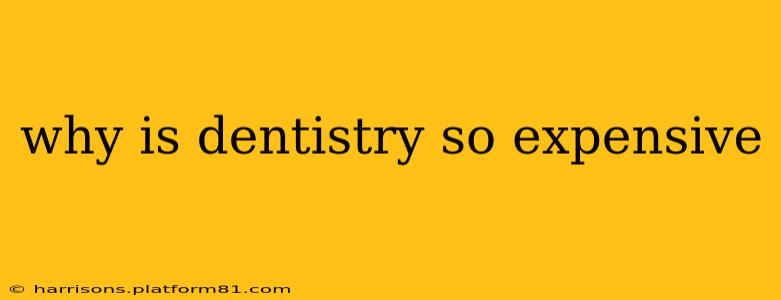Dental care costs can be a significant burden for many, leaving many wondering why dentistry is so expensive. The high price tag isn't simply due to greedy dentists; it's a complex issue stemming from several interconnected factors. Understanding these factors can help you navigate the system and make informed decisions about your oral health.
What are the major factors driving up dental costs?
Several key components contribute to the overall expense of dental procedures. These include:
-
High Educational Costs and Training: Becoming a dentist requires years of rigorous education and training, including undergraduate studies, dental school, and often specialized residencies. This extensive education translates into significant student loan debt for dentists, which they must recoup through their professional practice. The cost of this training inevitably impacts the overall cost of dental services.
-
Advanced Technology and Equipment: Modern dentistry utilizes sophisticated technology, from digital X-ray machines and CAD/CAM systems for creating crowns and restorations to advanced lasers and microscopic tools. This equipment is expensive to purchase, maintain, and update, adding to the overall costs passed on to patients.
-
Labor Costs and Practice Overhead: Dental practices employ a team of professionals, including hygienists, assistants, and office staff. Salaries and benefits for this team, along with rent, utilities, insurance, and other administrative costs, contribute significantly to the practice's operational expenses, which are ultimately reflected in patient fees.
-
Specialized Procedures and Materials: Certain dental procedures, such as implant surgery, orthodontics, or cosmetic dentistry, require specialized skills, advanced materials, and longer treatment times. These factors contribute to higher costs compared to routine checkups and cleanings. The materials themselves, such as high-quality crowns, veneers, or specialized bonding agents, are often expensive to produce.
-
Lack of Insurance Coverage and High Deductibles: While dental insurance can help offset some costs, many plans have high deductibles, limited coverage for certain procedures, and annual maximums. This leaves patients responsible for a considerable portion of their dental bills, further contributing to the perception of high costs.
Why are some dental procedures more expensive than others?
The cost of dental procedures varies widely depending on several factors:
-
Complexity of the procedure: Simple fillings are generally less expensive than root canals, crowns, or extractions. The time, skill, and materials required for more complex procedures naturally drive up the cost.
-
Materials used: The type of materials used can significantly affect the price. For example, gold crowns are more expensive than porcelain crowns, and certain types of dental implants may cost more than others.
-
Location of the practice: Dental costs can vary geographically. Practices in urban areas with high overhead costs may charge more than those in smaller towns or rural areas.
-
Dentist's expertise and experience: Specialized dentists (e.g., orthodontists, periodontists, oral surgeons) often charge higher fees due to their advanced training and expertise.
Is there a way to reduce dental expenses?
Yes, several strategies can help manage dental costs:
-
Regular checkups and preventative care: Preventing dental problems through regular brushing, flossing, and professional cleanings can significantly reduce the need for more expensive procedures in the future.
-
Negotiating payment plans: Many dental practices offer payment plans or financing options to make treatment more affordable.
-
Shopping around for dental insurance: Compare different dental insurance plans to find the best coverage for your needs and budget.
-
Considering less expensive alternatives: Discuss different treatment options with your dentist to see if there are less expensive alternatives that achieve the same outcome.
-
Seeking care at dental schools: Dental schools often offer discounted services performed by students under the supervision of experienced faculty.
Understanding the factors contributing to the high cost of dentistry empowers you to make informed decisions about your oral health. By prioritizing preventative care, comparing treatment options, and exploring financing options, you can better manage dental expenses and maintain a healthy smile.
